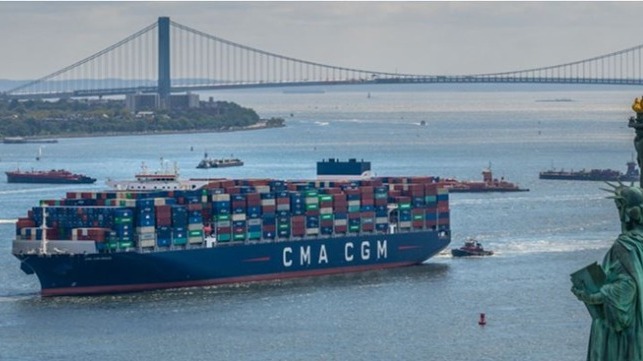Conservationists Say Record Containership Sped Through Protection Zone

While much of the attention in the past few days has been on the arrival of a record-setting new boxship in the U.S. East Coast ports, an ocean conservancy environmentalist group is accusing the new ship of failing to slow down in a recognized whale protection zone.
The container ship CMA CGM Brazil made history with her arriving at the Port of New York and New Jersey on September 12. With a capacity of 15,072 TEU and 1,200 feet in length, it was the first U.S. stop for the vessel which became the largest to arrive first in Halifax, then docking in Elizabeth, New Jersey, before continuing south to Virginia, Savannah and Charleston.
The ocean conservancy group Oceana however issued a report saying that the CMA CGM Brazil exceeded the 10-knot voluntary speed limit in a right whale conservation zone during its voyage south from Canada to the New York area. The group reported it used a new tool launched in July called Ship Speed Watch to monitor the vessel’s speed in the slow zones established to protect the whales. The U.S. government created the Dynamic Management Area south of Nantucket earlier this month to protect an aggregation of North Atlantic right whales. The zone was recently extended through September 29.
Oceana says that the Malta-flagged vessel reported transiting through the area south of Nantucket on September 11 and 12 at a speed of up to 13.4 knots.
“By ignoring the slow zone, this ship, longer than two Washington monuments and wider than a football field, sped through an area with a known aggregation of North Atlantic right whales. While any size vessel can be lethal to these whales, the sheer size of this one requires an added level of caution,” said Whitney Webber, campaign director at Oceana. “Oceana’s analysis earlier this year showed that many ships are ignoring these voluntary slow zones. To protect North Atlantic right whales, we must shift to expanded mandatory slow zones that require ships to reduce their speed when whales are present along their migratory routes. When ships slow down, it will help save whales.”

that matters most
Get the latest maritime news delivered to your inbox daily.
Collisions with ships are one of the leading causes of North Atlantic right whale deaths, according to Oceana. They said that research suggests that if ships slow down to 10 knots or less, they can reduce the risk of death by up to 86 percent.
Oceana says it reached out to CMA CGM for comment but has not received a response.
